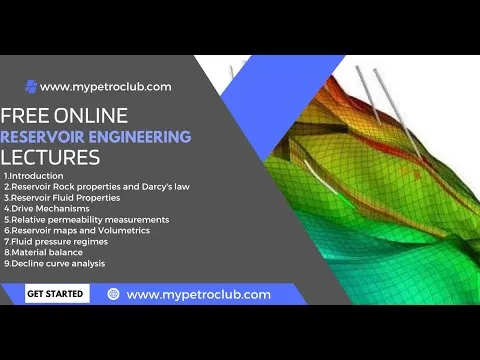
Applied Petroleum Reservoir Engineering 
This course provides a comprehensive introduction to Petroleum Reservoir Engineering, taught by renowned expert Dr. Ron Terry. Students will learn the basic concepts, tools, and techniques to analyze well performance and manage a petroleum reservoir, including the material balance equation, Darcy's law, rock and fluid properties, enhanced oil recovery, well testing, and history matching. With Microsoft Excel and VBA, calculations are made easier and more intuitive. Homework problems and solutions are provided to help students gain a better understanding of the material. Upon completion, students will have the knowledge and tools to analyze well performance and manage petroleum reservoirs. ▼
ADVERTISEMENT
Course Feature
![]() Cost:
Cost:
Paid
![]() Provider:
Provider:
Udemy
![]() Certificate:
Certificate:
Paid Certification
![]() Language:
Language:
English
![]() Start Date:
Start Date:
2015-06-01
Course Overview
❗The content presented here is sourced directly from Udemy platform. For comprehensive course details, including enrollment information, simply click on the 'Go to class' link on our website.
Updated in [September 19th, 2023]
What does this course tell?
(Please note that the following overview content is from the original platform)
Course Description Learn the basic concepts, tools, and techniques to analyze well performance and manage a petroleum reservoir. Build a strong foundation in Petroleum Reservoir Engineering with this course for students and practitioners Material Balance EquationDarcy's LawRock and Fluid PropertiesEnhanced Oil RecoveryWell TestingHistory Match The Industry Standard for Reservoir Engineering Craft and Hawkins' classic introduction to petroleum reservoir engineering with Applied Petroleum Reservoir Engineering has been fully updated for new technologies and methods, preparing students and practitioners to succeed in the modern industry. In this course, renowned expert Dr. Ron Terry will review the history of reservoir engineering, define key terms, carefully introduce the material balance approach, and show how to apply it with many types of reservoirs.Next, they introduce key principles of fluid flow, water influx, and advanced recovery (including hydraulic fracturing). Throughout, they present field examples demonstrating the use of material balance and history matching to predict reservoir performance. For the first time, this edition relies on Microsoft Excel with VBA to make calculations easier and more intuitive.Content and Overview The first two sections are designed to bring beginners up to speed with an introduction to reservoir engineering and a review of rock and fluid properties. More experienced students jump in in section three to learn the material balance equation and learn how to apply it in all four reservoir types. The course is rounded out with a thorough review of Darcy's law, enhanced oil recovery, well testing and history matching.Throughout the course, we cover example problems and assign homework problems. We provide a video walking through the solution of those homework problems as well. The course culminates in the history matching problem which incorporates the concepts from each chapter. Students completing the course will have the knowledge and tools to analyze well performance and manage petroleum reservoirs.We consider the value of this course from multiple aspects, and finally summarize it for you from three aspects: personal skills, career development, and further study:
(Kindly be aware that our content is optimized by AI tools while also undergoing moderation carefully from our editorial staff.)
What skills and knowledge will you acquire during this course?
During this course, students will acquire a range of skills and knowledge in the field of Applied Petroleum Reservoir Engineering. They will learn the basic concepts, tools, and techniques necessary to analyze well performance and effectively manage a petroleum reservoir.
One of the key skills that students will develop is the ability to apply the material balance equation, which is a fundamental concept in reservoir engineering. They will learn how to use this equation to calculate important parameters and make predictions about reservoir performance.
Additionally, students will gain a solid understanding of Darcy's Law, which is a principle that describes fluid flow through porous media. They will learn how to apply this law to analyze fluid flow in different types of reservoirs.
Furthermore, students will acquire knowledge about rock and fluid properties, which are essential factors in reservoir engineering. They will learn how to characterize and analyze these properties in order to make informed decisions about reservoir management.
The course also covers the topic of enhanced oil recovery, including techniques such as hydraulic fracturing. Students will learn about the principles and methods involved in these advanced recovery techniques.
Well testing is another important aspect of reservoir engineering that will be covered in this course. Students will learn how to design and interpret well tests to gather valuable data about reservoir performance.
Finally, the course will introduce the concept of history matching, which involves comparing model predictions with actual field data. Students will learn how to use history matching to validate and refine reservoir models.
By the end of the course, students will have acquired the necessary skills and knowledge to analyze well performance and effectively manage petroleum reservoirs. They will be able to apply the concepts, tools, and techniques learned throughout the course to real-world reservoir engineering problems.
How does this course contribute to professional growth?
This course, Applied Petroleum Reservoir Engineering, contributes significantly to professional growth by providing students and practitioners with the necessary knowledge and skills to succeed in the modern petroleum industry. By learning the basic concepts, tools, and techniques to analyze well performance and manage a petroleum reservoir, individuals can build a strong foundation in Petroleum Reservoir Engineering.
Through this course, individuals will gain a deep understanding of key principles such as the material balance equation, Darcy's Law, rock and fluid properties, enhanced oil recovery, well testing, and history matching. These concepts are essential for effectively managing and optimizing petroleum reservoirs.
By studying real-world field examples and completing homework problems, students will develop practical skills in applying the material balance approach and history matching to predict reservoir performance. Additionally, the course incorporates the use of Microsoft Excel with VBA, making calculations easier and more intuitive.
The course also provides a comprehensive review of fluid flow, water influx, and advanced recovery techniques, including hydraulic fracturing. This knowledge is crucial for staying up-to-date with the latest technologies and methods in the industry.
Overall, completing this course equips individuals with the knowledge and tools necessary to analyze well performance and effectively manage petroleum reservoirs. This enhanced skill set will contribute to their professional growth by making them more competitive and valuable in the petroleum industry.
Is this course suitable for preparing further education?
Yes, this course is suitable for preparing further education. It provides a strong foundation in Petroleum Reservoir Engineering and covers key concepts, tools, and techniques necessary for analyzing well performance and managing a petroleum reservoir. The course is designed for both students and practitioners, ensuring that individuals at different levels of experience can benefit from it. Additionally, the course incorporates field examples and practical applications, allowing learners to apply their knowledge in real-world scenarios. By completing this course, students will have the necessary knowledge and tools to succeed in further education and careers in the petroleum industry.
Course Syllabus
Introduction to Petroleum Reservoirs and Reservoir Engineering
Review of Rock and Fluid Properties
The General Material Balance Equation
Single Phase Gas Reservoirs
Gas Condensate Reservoirs
Undersaturated Oil Reservoirs
Saturated Oil Reservoirs
Single-Phase Fluid Flow in Reservoirs
Single-Phase Fluid Flow in Reservoirs
The Displacement of Oil and Gas
Enhanced Oil Recovery
History Matching
Course Provider

Provider Udemy's Stats at AZClass
Discussion and Reviews
0.0 (Based on 0 reviews)
Explore Similar Online Courses

Become a Reservoir Engineer (Level-Beginner)

Primavera P6 Essential Training

Python for Informatics: Exploring Information

Social Network Analysis

Introduction to Systematic Review and Meta-Analysis

The Analytics Edge

DCO042 - Python For Informatics

Causal Diagrams: Draw Your Assumptions Before Your Conclusions

Whole genome sequencing of bacterial genomes - tools and applications

Applied Reservoir Engineering (Reservoir Simulation with PETREL and ECLIPSE ( Petrel RE) e-Course
![[Webinar]: 10 Reservoir Engineering Analyses](/ccsimg/dcs/img_tools/b16992e609b47d9f806ebae60ee1b38d.webp)
[Webinar]: 10 Reservoir Engineering Analyses


Start your review of Applied Petroleum Reservoir Engineering